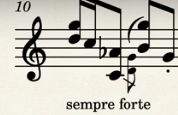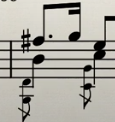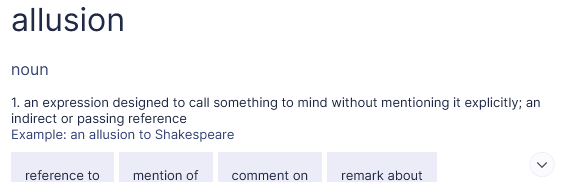All Activity
- Past hour
-
PavleGavrilovic joined the community
-
Here is a revised version of the piece (played with the Flat app). Once again, any and all feedback is appreciated Nocturne Ab (second draft).mid
-
Ah ha! That would explain it!
- Today
-
PeterthePapercomPoser started following Shepherd's Lullaby and ★Jazz Orchestration-Composition
-
A project that was rejected and never saw the light of day.
-
- wrriten arranged & produced by filmscore
- jazz bigband
- (and 1 more)
-
Thanks very much, Pate. Yes, I'm pretty sure that's where I went wrong - I didn't realise that their part was meant to be read an octave lower, so it all makes more sense now. They were actually singing an octave lower than I'd though.
-
I think this insight offers an opportunity for a discussion on how academically trained composers approach/think about composing; and how others who compose with less of an academic training/background approach their projects. Mark
-
Thanks for the shout out, Henry. I actually record all the parts myself instead of using samples, which may be the difference. As an alto, I generally have the range to also record soprano and tenor parts. The lowest bass parts are too low for me, so I sing them up a few steps and use Garageband's "transpose" feature to shift them back down to where they are supposed to be. It sounds like I've been dropped down a well, but it works well enough.
-
Hi, guy, I suspect the problem is that an octave above middle C really is quite high for most tenors. Counter tenors can sing that, or higher, but they are an exceedingly rare voice type. The samples you bought may be giving you a more realistic idea of what you would get from a group of vocalists than your composition software. It's not that men who can sing that high don't exist. That is technically a range some tenors can sing in, but only a tiny number. Take a look at some standard choral repertoire and you can start to get an idea of the more commonly used parts of the range for different voice types. And remember that it is only in modern times that we have started using the "modern" tuning. Historic pieces look like they are written higher than they actually were, because the composers and singers were using a different tuning standard when they were written, and they are still performed down at that historically accurate tuning today.
-
I wrote this piece ten years ago, but have just made a new multitrack recording of the parts, so I thought I would share it here. Yes, you are correct. The bass line is being sung by an alto dropped down a well. (GarageBand makes it possible for me to sing all the parts, but I have to use the transpose feature to record the lowest bass notes, which creates a little distortion to the sound quality). The sheep is a genius of place; why would she stray? Here is the homeland. Here, her mother's house. Feed my sheep. Lead them home. Let them rest. Sisters, all among the hills, chanting their Daily Office: "There the rain licks into little pools. There, a dip to hide new lambs." "Take my coat," she said. "You are a guest."
- Yesterday
-
Henry Ng Tsz Kiu started following ★Guessing-Game №1
-
PeterthePapercomPoser started following ★Guessing-Game №1
-
Who doesn't Recognize this " 7 Second Signature Intro " ?
-
The way that musehub works best is if you have it set to launch upon startup. it has little to no impact 🙂 Also, the Musehub login is different from the Musescore.com / .org logins I found a solution to it. I'm going to make a second post with an updated video to resolve some balancing/sound issues, and to showcase the reason why that was happening. To give you a summary, apparently I have to apply a soundflag to each part, and set it to "Classic Phrasing" to fix that... Who knew... lol
-
Let me try something new. I believe the audio issues that you all are hearing with my uploads are stemming from my use of Dolby Atmos, external speakers, and equalized headphones. I don't have a Raw Audio output to proof listen-to after writing music. The Musescore mixer is also notoriously under-monitoring for gain and overload, as in muse mixer, it didn't indicate this at all. It indicated French Horn was much lower than Trumpet, among other inconsistencies
-

🌎 World-International Music
FILMSCORE replied to FILMSCORE's topic in Incidental Music and Soundtracks
Concluding part of "World-International Music" 🇺🇸 America,🇬🇧 United Kingdom,🇪🇸 Spain, 🇦🇹 Austria,🇩🇪 Germany,🇮🇪 Ireland- 1 reply
-
- flavours
- world-international music
- (and 6 more)
-
Henry Ng Tsz Kiu started following The boreal forest
-
PeterthePapercomPoser started following The boreal forest
-
there’s more where this came from
-
Hi again @Dima Kravets! I agree with what @luderart has said above about the difficulty of some of the double and triple stops. Including consecutive double stops that can be really difficult as well! Such as these: and these: In the first image the D and G have to be played on the G and D strings respectively and right after using those two strings for the C and Ab. In the 2nd image the G and D open bottom strings are played before moving to a parallel fifth on the A and E strings playing a B and F# which have to be barred at the same location on the finger board which can be difficult. I also agree that a real performer could definitely breathe more life into the composition with their interpretation. But it's a thousand times easier to make a musical interpretation if it is clear to the performer that the composer already has an idea of how the piece can be expressed in a musical way. This is especially important for pieces that are for a solo instrument because the soloist is tasked with keeping the momentum and musicality of the work all on their own which is much more intensive than collaborating with another performer. The soloist is asked to "make something out of the work" that in many cases has never been performed before. So having a good idea of what you want as the composer can really help the performer out and facilitate a future performance. And making a good rendition with lots of tempo changes and musical indications as to how the piece should sound even in electronic form is important as well (perhaps as a selling point to get a performer convinced to perform it). I see from your profile that you specialize in chamber music so you probably already have a good idea about that. But when you say things like: it makes me think that you don't see the point or value of making a realistic rendition, which is a shame. Needless to say, the piece sounds very mechanical throughout and could stand from some humanization and TLC to improve it. But it's better to already be thinking of those things as you're composing it rather than having to go back and revise a piece that wasn't conceived musically to begin with. That's just my own perception of the piece however. I look forward to hearing more of your contributions to the forum (as well as potentially your opinion about other composers' works on the website!) Thanks for sharing. P.S. I'm sure the reviewers of your work (including myself) would appreciate a ❤️ or a 🏆 reaction/acknowledgment of their time and effort that they took to listen and formulate a response. It would really help our little musical community flourish! Thanks in advance!
- 2 replies
-
- 1
-

-
- classic
- tiny pieces
-
(and 3 more)
Tagged with:
-

🟫 𝑺𝒚𝒎𝒑𝒉𝒐𝒏𝒊𝒄 𝑶𝒓𝒄𝒉𝒆𝒔𝒕𝒓𝒂𝒕𝒊𝒐𝒏
FILMSCORE replied to FILMSCORE's topic in Incidental Music and Soundtracks
Thankyou 4 your Indepth-Review, i was shocked to see it. Thankyou............ The Harp plays only Once, at the Start of the Track with the Timpani, Primarily to initiate the "SIGNATURE" Thankyou..........The software can take "BOTH-BARRELS" ...... he he , quick harp glissandi is possible, and there used in other productions already posted. Thankyou..........All Production-Trax posted ,are using a "RICOCHET" Reverb, and there is a problem with it, as this software is a Classified-Alpha/Beta version. ---------------------- I had to Look up 2 words that you used, as iv never heard them B4.............. But now i know , & Thanx again 4 your Detailed Review. -
Henry Ng's Moment Musical No. 2, arranged for organ
PCC replied to PCC's topic in Piano Music, Solo Keyboard
It's a limitation of how I use MS probably. irl I would couple the manuals to the pedalboard so the bass would sound more prominent irl -
Henry Ng Tsz Kiu started following Sonata in One Movement (ca. 17') and 'Poème': a 30-second hommage to Scriabin
-
.thumb.png.8b5b433a341551e913a34392660bc95b.png)
'Poème': a 30-second hommage to Scriabin
PeterthePapercomPoser replied to 林家興's topic in Piano Music, Solo Keyboard
Hello @林家興! Nice job! This reminds me of @Thatguy v2.0's Prelude No.11! In that piece, he tried to marry the concept of the Mystic Chord with the Acoustic scale. Not surprising that it seems similar to this piece given that they're both influenced by Scriabin. They both have a sense of being a kind of unanswered question or have a mysterious unfinished-ness about them. It would be great to hear this performed live! Perhaps, if you don't perform it yourself, you could ask @Henry Ng Tsz Kiu to perform it for you? Thanks for sharing! -
.thumb.png.8b5b433a341551e913a34392660bc95b.png)
🟫 𝑺𝒚𝒎𝒑𝒉𝒐𝒏𝒊𝒄 𝑶𝒓𝒄𝒉𝒆𝒔𝒕𝒓𝒂𝒕𝒊𝒐𝒏
PeterthePapercomPoser replied to FILMSCORE's topic in Incidental Music and Soundtracks
Hi @FILMSCORE! Nice orchestration! To me it has the hallmarks of a charcuterie of different orchestral textures from the classical orchestral literature. The beginning starts as if you're going to give us a trial run of all of your orchestral samples for us to test out how your orchestral libraries sound. There's a clear allusion to Holst's Jupiter from the Planets Suite (around the 1:00 mark although the melodic content in the brass is a bit different). I'm not sure what the fanfare near the beginning is from. The harp is often too loud in comparison to the rest of the instruments and is not doing its signature glissando flourishes that could give your orchestration so much more color. Although it might be really taxing on your software/equipment to render quick harp glissandi with so much reverb. It might be easier to render the harp and the rest of the instruments with less reverb especially if they're all playing together. Thanks for sharing! -
.thumb.png.8b5b433a341551e913a34392660bc95b.png)
Bateux arrivant au quai
PeterthePapercomPoser replied to Samuel_vangogh's topic in Piano Music, Solo Keyboard
Hello @Samuel_vangogh! I like the vibe of this piece and as you've already stated above, I understand that your intent was to create a certain background mood? It's not too attention getting and serves that purpose well. Also about the counterpoint - the way you use it is well suited for your intent because the heterophonic/polyphonic textures tend to lose the focus of the melodic line. This would be more of a problem in a more deliberately thematic work like a sonata but I think it works well here. Thanks for sharing! -
.thumb.png.8b5b433a341551e913a34392660bc95b.png)
Feedback on Piano Piece
PeterthePapercomPoser replied to Ho Sen Ken's topic in Piano Music, Solo Keyboard
Hi @Ho Sen Ken! Wow! What a great and intense Bartok-like piano banger! It reminds me of one of Bartok's early works Scherzo in E minor for Piano. Although admittedly, your work is a bit more similar to later more harmonically adventurous works. I'm looking forward to hearing more of your contributions to the forum (and besides sharing your music you could also tell us what you think of other composers' works!) Thanks for sharing! To reward those of us who have taken the time to listen and review your pieces, you could also leave a ❤️ or a 🏆 reaction to support our community and let us know that you acknowledge our time and effort we've put in towards reviewing. I'm sure the people above who have reviewed your piece as well as myself would really appreciate it! Thanks! -
Hello @Fugax Contrapunctus! I like the idea of this piece but I personally would do a few things differently if it were mine to make it more expressive and bring out its best features. The thing that bothers me most about it right now as-is is that the tempo it's played at and the fact that the piano starts it soon makes the individual voices hard to hear and instead ends up sounding like a sequence of chords metronomically and mechanically performed. I think if it were played slower and with the piano removed it would bring out its best features of being a really great and haunting chromatic canon! The other reason that this would work better (in my opinion) is that the listener would then be able to absorb the melodic material without immediately being interrupted with the stretto-like canonic treatment that you employ in the piano part. Of course, you're the composer and I don't expect you to make these changes, but I thought I'd mention my rationale behind why I'd want it this way anyway for any benefit that it could possibly impart to you in the future. But I thoroughly enjoyed this canon - thanks for sharing!
- Last week
-
Hi @PCC! Great job with this arrangement! I was having trouble hearing the bass part in some of the sections so I turned on my bluetooth speaker but it kept glitching out like crazy with the sound cutting in and out constantly which made it unlistenable (and this happened only in the "principale" sections - it played the rest of the piece just fine for some reason). So I know that my inability to hear some of the bass parts was in part due to the speakers on my Chromebook. But I also question whether there might be something in the recording itself that makes my bluetooth speaker behave the way it did in the principale sections? Either way - I think I got the gist of your intent in how it's supposed to sound. Thanks for sharing!
-
.thumb.png.8b5b433a341551e913a34392660bc95b.png)
Solitude for Solo Piano
PeterthePapercomPoser replied to nostalgia's topic in Piano Music, Solo Keyboard
Hi @nostalgia! I listened to the most recently updated version. A nice piece made up of chord clusters and pentatonic melodies and chromaticism! It does sound quite contemplative - like solitude is expected to sound. Thanks for sharing!









